Heidi Martin's Blog
October 30, 2019
Changing From Within
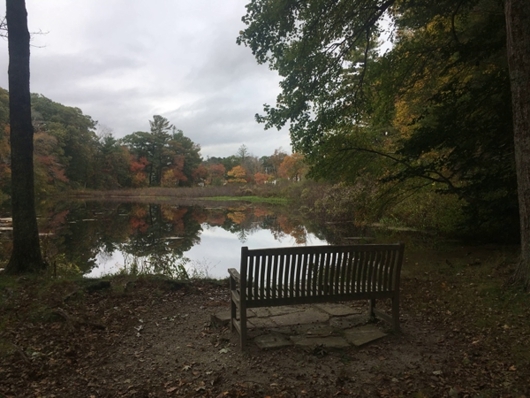
As the leaves change colors from lush greens to brilliant reds and shimmering golds, it reminds me of the changes we, too, want to experience in our lives. Maybe we want to illustrate a children’s book, eat healthier, or find more time to spend with our familes. We hope to make positive changes in our lives, but we aren’t sure exactly how to make them happen. Our doubts surface or obstacles get in our way, and soon these changes seem much harder to accomplish. Feeling discouraged, we become afraid to take a risk because we fear failure. We convince ourselves that our lives are fine just the way they are, and we put our dreams on hold, telling ourselves that things are better this way — the way they have always been. But, that’s simply not the case. We can make changes in our lives — big changes. But we have to believe that they are possible. Dreams and changes are worth the effort; we just have to be willing to give them a chance.
At some point in our lives, we all yearn to reach our full potential in our careers, our personal lives, or even our spiritual growth. This is where our dreams are born, leaving us feeling invigorated, excited, and optimistic about the future. But over time, if these dreams go unrealized, they can start to fade. We have more questions than answers, and our fears of failure begin to grow. However, this is where we have a choice. When things don’t go as planned in our lives, that does not mean we should give up on our dreams. For our dreams are the best parts of ourselves. Instead of running away from our fears, we should meet them head-on. Once we identify the obstacles that are standing in our way, we can figure out how to overcome them. We develop a plan and stick to it, taking small steps along the way. In life, it is our challenges that are also opportunities for us to learn some of our most valuable lessons. Believing that can make all the difference. It’s about moving forward rather than looking back. It’s about discovering the whys behind our dreams. Once we make positive changes in our lives, we begin to grow and become the people we were made to be. We dream, we believe, and we achieve.
Think about the changes you want to make in your life and the dreams you want to pursue. Do you want to exercise more, take a cooking class, speak in front of people, or start your own business? Be as specific as you can and think about why you want to make those changes. Say your dreams out loud — speaking them into existence. If during this process, doubts begin to creep in, let them go. Don’t let fears or excuses take over. Develop a plan to take whatever steps are necessary to make your dreams a reality. Avoid distractions like sitting on the couch and watching Netflix (which I love to do, by the way) that will keep you from working toward your dreams. As Tony Robbins said, “If you change nothing, nothing will change.” It is your choice. Even the smallest steps forward will help. This is your life — embrace it, love it, and truly live it. That is my hope for each of you. Here are some questions to get you started.
What changes would you like to make in your life, and what dreams do you want to pursue?
Why are these changes/dreams important to you?
How can you make those changes/dreams become a reality? What steps can you take?
What or who is holding you back from making these changes?
How can you encourage yourself to take the first step to changing the rest of your life?
How does it feel to know you can change your life and become the person you were made to be?
Repeat this mantra: “Think big, believe big, and I will achieve big!!”
Like the trees, embrace the next season of your life and make whatever changes are necessary to show your beautiful colors. Evolve, grow, and mature into the person you were made to be. Go rock climbing, audition for that play, sing a solo, or write that blog — whatever inspires you. That is where your true passion lies. Dream it, believe it, and achieve it.
March 21, 2019
Tidying Inside and Out

A few months ago, my fourteen-year old daughter watched a documentary on minimalism which highlighted the benefits of living a simpler life. Intrigued by the idea, she began researching the topic and soon discovered Marie Kondo’s book, The Life-Changing Magic of Tidying. Kondo believes that through the process of tidying we can change our entire lives. Tidying enables us to examine every item in our possession to determine whether each item is useful or whether it sparks joy for us. If it does neither of those things, then that item can be released and given away. Once this process is complete, Kondo believes we will not only have a tidier space, but tidier lives as well.
After reading Kondo’s book, my daughter was inspired to take action. Over the next few weeks, she sorted through everything she owned. She gave away hundreds of items, claiming that each time she gave something away it made her feel more joyful and more free. When she was finally finished, she felt like a changed person and encouraged our family to give tidying a try. After watching the documentary and reading Kondo’s book, I too was inspired to begin the tidying process. As Kondo recommends, I began by placing every item of clothing on my bed: socks, underwear, shirts, pants, belts. My king-size bed was covered with my clothes — I could not believe all the items that I owned. I was embarrassed. Immediately, I examined each item, selecting only the things that I needed or the things that sparked joy for me. I gave away the rest. Large garbage bags filled with clothing went to Goodwill. The more I gave away, the lighter and freer I felt.
Once I finished my clothes, I went on to other items in my house, feeling more joy as I continued. After a couple of weeks, I had examined nearly every possession and was then ready to tackle the last category: sentimental items. I knew this category would be the most challenging because I’ve always had a strong sentimental attachment to things. But I was determined to give it a try. As I began sorting through my high school memorabilia, I was struck by the realization that so much of what I had kept represented a person that I used to be. Although many of the items brought back fond memories, some of them had the opposite effect. By examining every sentimental item and determining whether it sparked joy for me, I was forced to deal with my past and let go of old emotions. Tidying helped me look back on the person I had been and think about the person I had become. It helped me decide what items from my past I wanted to take into my future and what parts I knew it was time to leave behind. As Kondo states, “When we really delve into the reasons for why we can’t let something go, there are only two: an attachment to the past or a fear for the future.” Tidying helped me face my past, so I could find real joy once again.
This week, consider the benefits of tidying in your own life. The questions below will help get you started:
What are some of the things you love about your home? Are there any areas that could use some de-cluttering? What areas are those?
Marie Kondo states, “The question of what you want to own is actually the question of how you want to live your life.” What do you think she means by this?
Are you someone who holds onto items or beliefs or emotions from your past? If so, how could this be holding you back from the present?
Marie Kondo also states, “No matter how wonderful things used to be, we cannot live in the past. The joy and excitement we feel here and now are more important.” What are your thoughts on this idea?
By tidying up your space, it can help tidy up your life. How is this possible? How can tidying help you feel more free?
In the next few weeks, what areas of your house or your life might you plan to tidy up?
Tidying can change the space you live in, but it can also help you discover your feelings about the past, present, and future. Take some time to tidy and feel the freedom that it brings. Keep what sparks joy and notice the difference it makes in your life. Be surrounded with the things you love and see how much freer you feel. As Kondo believes, “The space in which we live should be for the person we are becoming now, not for the person we were in the past.”
Also, be sure to check out Marie Kondo’s new show on Netflix. It shows first-hand the powerful impact tidying can have in our lives. Good luck and happy tidying!
December 20, 2018
Unexpected Glory

For many of us in December, it is easy to become lost in the busyness of the holiday season. We are shopping, baking, traveling, wrapping, caroling and often have more to do than we could ever accomplish. But the holidays are not the only important thing that is happening this month. For those of us in the northern hemisphere, December 21st is the winter solstice — the time of year when the outer world is the darkest. The winter solstice is a day where we can utilize this time of great darkness to shed light upon any fears or emotions that we have buried within ourselves. The solstice can serve as a reminder that even in the darkest of times, the light will return. As the American author and spiritual teacher, Gary Zukav states, "The winter solstice has always been special to me as a barren darkness that gives birth to a verdant future beyond imagination, a time of pain and withdrawal that produces something joyfully inconceivable, like a monarch butterfly masterfully extracting itself from the confines of its cocoon, bursting forth into unexpected glory."
Winter is a time of barren darkness and, for many of us, spending time alone in the dark can make us feel anxious or alone. It’s almost as if the extensive blackness allows our deepest darkest fears to emerge. Darkness can do this — it can make us afraid of the things that we cannot see. That is why it can be so debilitating. In a similar way, it’s also true with our emotions and feelings. Many of us try to bury our deepest fears and emotions, hoping we can hide them in the dark so we don’t have to face them. We hope they will simply disappear. Unfortunately, that is not going to happen. In fact, that’s how our fears become even more powerful and debilitating. For that reason, we must bring them out of the darkness and back into the light by going within and examining them, so the healing process can begin. Yet, we often resist facing our fears because it isn’t easy; it can mean facing a pain that seems unbearable. We don’t want to re-live our past hurts. However, that is exactly how we move past them. Only when we face our darkest fears and pain can we begin to move toward the light once again. And through facing this pain, we begin to see that the light does penetrate the darkness, and our hope returns.
This week during the winter solstice, shed some light upon your own fears and emotions. Reflect upon your life experiences and what they have taught you. The questions below will help get you started:
What are your greatest fears? What feelings have you kept buried beneath the surface? What can you do to face these feelings and fears so you can move past them?
When have you experienced darkness in your life? What helped you through it? How did the light return after this dark time?
Are you going through a dark time in your life right now? What gives you hope in the midst of these difficult times?
What did you learn from your past experiences of the light returning to your life after dark times? What message of hope can that bring to you?
The winter solstice provides the perfect opportunity for us to go within to shed light upon our darkest fears and begin the process of healing. When we are willing to work through our pain, the darkness will not last forever. The light always returns and our hope in the future is renewed. So, we, like a monarch butterfly, can “burst forth in unexpected glory.”
Have a wonderful holiday season and let your light shine in the new year!
May 4, 2018
A Time for Rebirth

This past week, I've been spending more time outdoors as the temperatures are finally beginning to climb into the upper 50’s and 60’s. For those of us in colder climates, and specifically in New England, the warmer weather is a welcome change. Signs of life are emerging everywhere — birds are joyfully chirping in the trees, yellow daffodils are in full bloom, and tiny buds are sprouting up from the soil. Spring is a vibrant time of new beginnings, reminding us that life is about rebirth — about growing toward our potential. Just as seedlings change and grow, we, too, must be willing to change and evolve into the people we are meant to be; we can give birth to not only new versions of ourselves, but to new ideas as well.
In order for plants to be reborn, most of them are dormant during the winter when they rest and conserve their energy. Then when springtime comes, the earth begins to warm and conditions change, allowing these plants to break forth and grow. With the proper nourishment, these plants often grow bigger and stronger than ever before. Like the plants, we go through periods of dormancy when we also rest and conserve our energy. But as conditions in our lives begin to change, we are given an opportunity to expand and grow. With proper nourishment, careful reflection, and a willingness to make whatever changes are necessary, we can be reborn into the people we are meant to be.
Some of us will make important life changes regarding careers, relationships, or even the places where we live. But not all of the changes we make will involve major life transitions. Some changes will be on a much smaller scale. For example, if we choose to be more positive, we may notice that our relationships become less strained, and we experience more contentment in our lives. These small shifts in our attitudes can have a lasting impact on our lives. Or perhaps we may decide to get up thirty minutes earlier every morning so we can exercise. Soon, we may experience higher energy levels and an improvement in our moods, and overall, we feel happier. Our bodies become more toned, and we are able to maintain healthier weights, increasing our confidence and overall body image. These small changes create big transformations. So, regardless of whether the changes are big or small, they create opportunities for us to be more confident and express ourselves and our ideas more openly.
But, sometimes, when it comes to reaching our potential, we can be our own worst enemies. If our lives aren’t going as planned, we make excuses. We are too busy, too old, too financially strapped, too uneducated — the lists go on and on. But these excuses are stunting our growth rather than expanding it. So, perhaps a more effective approach is to change our perspectives. When we do, we may find that the impossible now becomes the possible. For example, if we want to go back to school but don’t think we can afford the tuition, perhaps we could research scholarships and low-interest loans that might be available to us. By doing so, we might open up new doors and opportunities. Or, if we find ourselves in the middle of a divorce, we can choose to see it as an opportunity for a fresh start. Soon, we begin taking more risks: enrolling in new classes, beginning new hobbies, or starting new businesses that we never would have done before. When we are willing to change our perspectives, we can change our experiences, creating new and improved versions of ourselves.
This week, as spring continues to bring forth new life, think about your own rebirth. Are there big or small changes you would like to make? Would making these changes help you become more of the person you were meant to be? Conditions around us are constantly changing. But it is up to you whether you will explore the opportunities that these conditions create. Reflect upon your life and explore your options. See what doors may open for you. Remember, changing your perspective can change your experience. Be confident and grow toward your potential, creating exciting beginnings for your life. Then bloom like the daffodils, more beautiful and stronger than ever before.
November 21, 2017
Through the Lens of Gratitude

Thanksgiving is one of my favorite holidays, and although I do love the mashed potatoes, stuffing, and pumpkin pie, there is something I love even more about it. I love that Thanksgiving is a day to celebrate and give thanks for all that we have been given. Instead of focusing our attention on the things we want, we can focus on the things we already have and the important people in our lives. There are many blessings all around us and yet, many of us take them for granted. That’s why Thanksgiving provides us the perfect opportunity to take a step back and look at the world through a new lens - the lens of gratitude. Our feelings of gratitude impact how we see ourselves, how we see each other, and how we see the world. Gratitude creates feelings of compassion, empathy, hope, and contentment. When we are content with our own lives, we begin to view others and the world in entirely new ways. We are thankful for the moments we share and for the connections that exist between all of us. We want to share this love and joy we feel with others, knowing that love is what truly brings us together.
Many of us know the importance of gratitude, yet it is often easy to overlook. This past spring, my husband and I began the process of looking for a “new” home. We wanted something in a quieter neighborhood that still met the needs of our family. After a long search, we finally found the home we wanted. It needed some work, but we were confident that all would turn out well in the end. We purchased the home and began replacing doors and windows, painting the interior, sheet rocking the garage and basement walls, and laying down new carpet. We also had some electrical and plumbing work done. But just as we thought the repairs were nearly finished, a few pipes started leaking and our oven wouldn’t heat up. Then the following afternoon, we discovered that the heat registers upstairs weren’t working. That’s when our contractor looked and me and said, “It’s like this house has gremlins.” I couldn’t have agreed more. Frustrated, I found myself saying, “You’re right. Everything seems to be going wrong. Can’t something go right, at least once?” Yet, as I listened to my own words in that moment, I realized that perhaps my perspective was part of the problem. For the past several months, I had been focusing on everything that was going wrong. I wasn’t looking at the positive aspects of a quiet neighborhood, a nice yard, or even a cozy home. I had been so focused on the negatives that I couldn’t even see the positives. So that day, I made a decision to be thankful for our home and the many blessings all around me: my husband, my children, our families, our friends, our dog, our health, and the community in which we live.
Once I began looking at my life through this lens of gratitude, I saw things differently. Maybe our house did still need some work, but we had made a lot of progress on the repairs we had already done. I also realized that what made this house a “home” was my family and my connection with them. It was the love we shared and the memories we would make that we would always remember. It showed me that through our connections with each other, our neighbors, our community, and our world, we are able to share the feelings of joy that contentment brings. Now, when I sit at my writing desk, I am thankful for where I am and the simple things all around me: the leaves falling off the trees, the kids playing in the backyard, and even the warm cup of coffee in my hand. I am so grateful for my home and for all of my blessings. My simple shift in perspective changed my life and allowed me to see the value of my connections all around me. I am content and have a new-found appreciation for not only my family and my home, but my neighborhood, my community, and the world as well.
This Thanksgiving, spend time with your family and friends and think about all the blessings in your life. For what or whom are you the most grateful? And what blessings might you have overlooked? When you view your world through the lens of gratitude, it can help you see things in entirely new ways. It enables you to focus on all that you have rather than all that you want. When you change your perspective, you can change your life. Then your compassion, empathy, hope, and love will expand, making all the difference in the world.
July 3, 2017
Be Like a Child
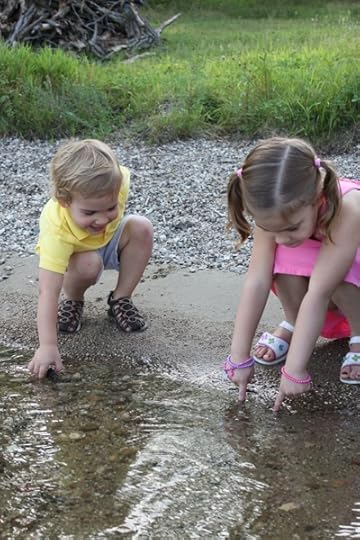
The summer is finally here, and it is the perfect time for us to break from our usual routines and enjoy our lives more fully. It’s important for us to plan some downtime where we can rest and recharge — even if it’s only for a short while. This summer, I’m planning to do exactly that. I’m taking a break from both my blog and my circling events in order to go within and renew my spirit. I know from past experience that when I take this much-needed downtime, it enables me to feel refreshed and re-energized when I return to my activities. That’s why downtime is so important. It helps us not only recharge, but it also helps us see things in a whole new light. So, I invite everyone to experiment with some downtime this summer. On sunny afternoons, take walks on the beach, read good books, or hike in the woods. Break free from your usual routines and have some fun. I know we all have responsibilities, but we can’t let them weigh us down. We have to learn to let go and laugh more — to be more like children, carefree and spontaneous.
Children know how to have fun. They run around the backyard with reckless abandon playing tag with their friends, they laugh hysterically if someone tells a funny joke, and they swing on the swings as high as possible in hopes that they might touch the sky. Staying in the moment, they don’t worry about whether their rooms are clean or whether they have homework to do. They love their downtime where having fun is their top priority, and that’s the way they want it to stay.
So, what happens to that enthusiasm and excitement for life as we get older? Where does our desire to have fun go? And how do we lose it so easily? In a word: responsibility. Once we become adults, most of us take our responsibilities very seriously. We know we have to work hard and provide for ourselves as well as for our families. We want to live the American dream, and that often involves making sacrifices along the way. Many of us work long hours, raise our children, mow our yards, cook our meals, clean our houses - and that’s only a fraction of our responsibilities. Expecting a lot of ourselves, we don’t often have much free time. So, we put our heads down and charge forward — putting one foot in front of the other, leaving little room for fun.
This summer, what if we switch things up a bit? What if we actually act like children and prioritize having fun? This can make a big difference in our lives. When we spend time with our family and friends doing the things we love like watching movies, playing board games, or even rock climbing, it can bring us great joy. We are able to laugh and let go, seeing the value of staying in the moment. Life doesn’t have to be such a struggle where we are bogged down with responsibilities all the time. Sometimes it’s just about finding joy in the little things. We need to grab every moment and live life fully — embracing fun and making it a priority in our lives. When we do that, we might be amazed at how much happier our lives become.
So this week and this summer, become like a child again and find some downtime. Look at the world with new eyes and see if you can make having fun a priority. Take a day off of work and do something you love: ride on a roller coaster and throw your hands up in the air as often as you can, go out to your garden and pick your favorite flowers to make a lovely bouquet, or paint a picture with finger paints getting your hands as messy as you can. Stay in the moment and have fun. You have responsibilities, but don’t let them take over every aspect of your life. Spend some downtime renewing your spirit. Laugh out loud and see how much better you feel when you let loose and have a good time. Call a friend and go to a concert or grab your partner and kids and make s’mores in the backyard while gazing up at the stars. Live your life as fully as you can — just like children do.
June 9, 2017
See Your World in a Whole New Light
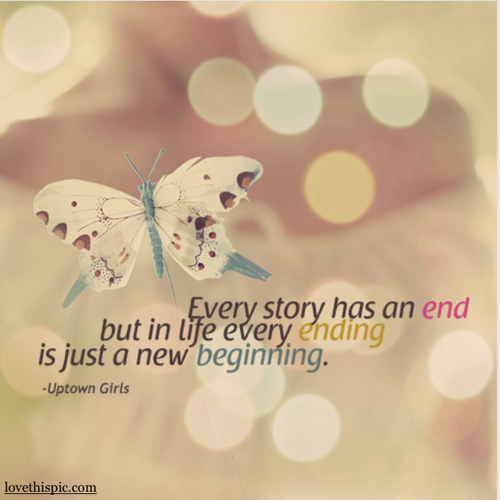
As the school year comes to a close, I am reminded how the endings of our lives are also new beginnings. My son is finishing his 5th grade year and will be going off to middle school in the fall. He is thrilled to be moving to a new school and is fully embracing this exciting time in his life. But as his mom, a part of me is sad that he is growing up so fast. Because he is graduating from elementary school, it somehow feels like I’m saying good-bye to his childhood. Yet, this ending is also an incredible new beginning - one where he will discover many things about himself and continue to grow into the amazing man he will become. Watching his eager anticipation of this important transition in his life, I know he is ready, and that makes me very happy indeed.
Transitions, like the one my son is experiencing, are a part of all of our lives. Whether it is changing jobs, moving to new homes, losing loved ones, or simply getting older - we experience endings that lead us to new beginnings. When we leave something behind, it opens us up to something new. Yet, transitions are sometimes difficult. When changes need to be made in our lives, we often don’t want to make them. We want to stay comfortable or keep things the way they have always been. But that’s not the way life works. Change is one of the few guarantees we have in this life. So it is important for us to remember that no matter how difficult transitions can be, they can also bring us new opportunities for growth. We may need to learn new computer skills, start cooking healthy meals, plant container gardens, or join social clubs. When we allow ourselves to be open to these opportunities, we may even realize our own inner strengths that have been there all along.
Transitions enable us to see our lives in a whole new light. In the midst of transitions, we may suddenly appreciate the people or things that have been present in our lives that maybe we had not noticed before - kind co-workers, meaningful employments, friendly neighbors, or even loving families. When we experience endings in our lives, our appreciation and gratitude are usually enhanced. We see the world with new eyes - glimpsing possibilities that we weren’t able to see before. Transitions also teach us many life lessons. They help us appreciate all the things that we have been given and enable us to look toward the future with newfound hope and optimism. They also remind us to stay in the moment, willingly experiencing all the joys and sorrows of life, for it is often through our sorrows where we develop empathy for one another. Our endings become our new beginnings as we move from one cycle to another - the death and re-birth of ideas, relationships, businesses, and eventually our lives. We cannot hold onto things forever; we must learn to let them go.
This week, think about the lessons your transitions have taught you. What transitions have you experienced in your life? Were they easy or were they difficult? What helped you through them? How did one ending lead you to brand new, even better, beginning? Change is always going to be a part of our lives. We cannot prevent that from happening. So, embrace your transitions and see what lessons they have to teach you. You can’t grow if you aren’t willing to reach for your highest potential. Transitions are opportunities - don't let them pass you by. Reach out and grab what’s right in front of you, even if it’s a little scary. Just like my son, grow into the person you were made to be. Let go and know that all will be well when you fully experience life and learn the lessons, for they may just help you see your world in a whole new light.
May 22, 2017
NEW-FOUND FREEDOM
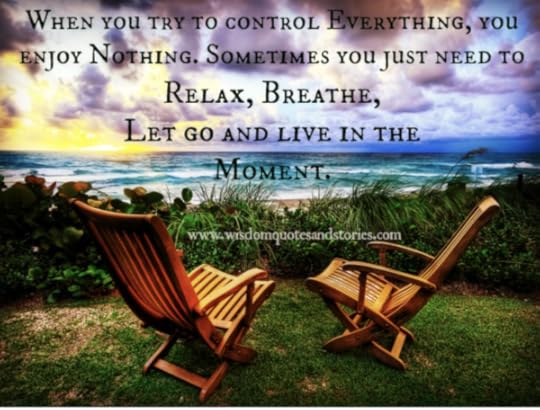
Our lives are filled with uncertainties. That’s part of what makes them both interesting and challenging. Right now, our family is living proof of that. Currently, we are searching for a new home. It has been quite a process, and there have been several unexpected developments along the way, but we are trusting that all will work out in the end exactly as it is supposed to. But trusting is not always easy, especially when it involves the important things in our lives. That’s why it’s helpful to remember that we cannot prevent uncertainties and changes from happening to us. So, the ways we choose to respond to these uncertainties becomes very important. If we can trust in the process and learn to “go with the flow,” our lives become much less stressful.
So, why is “going with the flow” such a difficult concept for most of us? In a word, control. We all want to think that we have control over our lives. We want to have a say in the things that are happening to us and the things that are happening in the world. We want to bring more order to the perceived chaos around us. Control serves as a way for us to keep our fears in check. When we believe we have control over situations or circumstances, they appear much less scary. We can live in our own little “bubble” and stay perfectly safe.
But, as many of us know, control is an illusion. A diagnosis, a broken relationship, a business failure, or a death can quickly show us that we actually don’t have control over much of anything in our lives. But we do have control over our beliefs and our reactions to the things that happen around us. Once we realize our lives aren’t meant to be controlled, we become free from our fears. But relinquishing our need for control is not easy. It may be one of the hardest things we ever do, but it is worth the effort. When we learn to let go, we see the world differently. We “go with the flow” and try to live in the moment, rather than worrying about what might happen in the future or what has happened in the past. We learn to trust more, knowing that our struggles will pass as they continue to teach us important life lessons. Eventually, we will be okay once again.
But learning to let go is a lifelong process. Some days it’s easier; other days it’s a bit more challenging. But this process has taught me that life doesn’t have to be such a struggle. When I release my need for control, things flow much more naturally, and I’m able to enjoy life more fully. Now, if I get an unexpected phone call and a friend wants to meet me for lunch, I leave my computer (even if my writing is unfinished) and meet her at the restaurant. Or, if it’s a beautiful evening and I want to take a walk on the beach, I jump in my car and drive to the sandy shore instead of staying home to clean my house. I let the day unfold as it will, releasing my need for control. I’ve learned that when I “go with the flow” and take the world as it comes, things work out even better than I could have imagined. Less resistance creates more freedom, and more freedom creates more joy. When we truly live in the moment, we experience the beauty of life in a whole new way.
This week, see if changing your perspective can make a difference in your life. Can you let go of your need for control? Can you learn to live in the moment and release the worry, knowing that all will eventually be okay? Can you practice “going with the flow?” Be open to the unexpected and try to experience life a little more fully. Watch the sun rise early in the morning or feel the moist dirt in your garden. Do the things you love and live in the moment. Your life isn't meant to be controlled - it’s meant to be lived. Everything doesn’t have to be such a struggle. Things come and then they go. Flow with this natural rhythm of life and enjoy your new-found freedom.
May 6, 2017
New-found Freedom
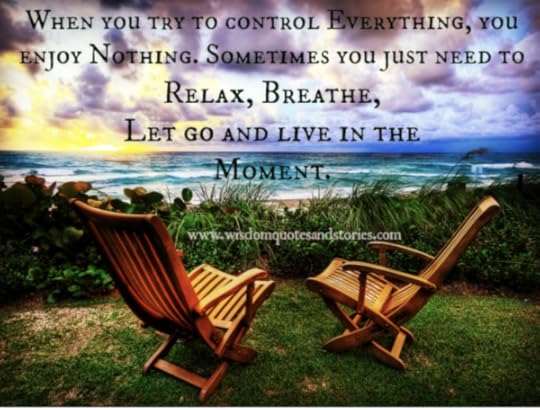
Our lives are filled with uncertainties. That’s part of what makes them both interesting and challenging. Right now, our family is living proof of that. Currently, we are searching for a new home. It has been quite a process, and there have been several unexpected developments along the way, but we are trusting that all will work out in the end exactly as it is supposed to. But trusting is not always easy, especially when it involves the important things in our lives. That’s why it’s helpful to remember that we cannot prevent uncertainties and changes from happening to us. So, the ways we choose to respond to these uncertainties becomes very important. If we can trust in the process and learn to “go with the flow,” our lives become much less stressful.
So, why is “going with the flow” such a difficult concept for most of us? In a word, control. We all want to think that we have control over our lives. We want to have a say in the things that are happening to us and the things that are happening in the world. We want to bring more order to the perceived chaos around us. Control serves as a way for us to keep our fears in check. When we believe we have control over situations or circumstances, they appear much less scary. We can live in our own little “bubble” and stay perfectly safe.
But, as many of us know, control is an illusion. A diagnosis, a broken relationship, a business failure, or a death can quickly show us that we actually don’t have control over much of anything in our lives. But we do have control over our beliefs and our reactions to the things that happen around us. Once we realize our lives aren’t meant to be controlled, we become free from our fears. But relinquishing our need for control is not easy. It may be one of the hardest things we ever do, but it is worth the effort. When we learn to let go, we see the world differently. We “go with the flow” and try to live in the moment, rather than worrying about what might happen in the future or what has happened in the past. We learn to trust more, knowing that our struggles will pass as they continue to teach us important life lessons. Eventually, we will be okay once again.
But learning to let go is a lifelong process. Some days it’s easier; other days it’s a bit more challenging. But this process has taught me that life doesn’t have to be such a struggle. When I release my need for control, things flow much more naturally, and I’m able to enjoy life more fully. Now, if I get an unexpected phone call and a friend wants to meet me for lunch, I leave my computer (even if my writing is unfinished) and meet her at the restaurant. Or, if it’s a beautiful evening and I want to take a walk on the beach, I jump in my car and drive to the sandy shore instead of staying home to clean my house. I let the day unfold as it will, releasing my need for control. I’ve learned that when I “go with the flow” and take the world as it comes, things work out even better than I could have imagined. Less resistance creates more freedom, and more freedom creates more joy. When we truly live in the moment, we experience the beauty of life in a whole new way.
This week, see if changing your perspective can make a difference in your life. Can you let go of your need for control? Can you learn to live in the moment and release the worry, knowing that all will eventually be okay? Can you practice “going with the flow?” Be open to the unexpected and try to experience life a little more fully. Watch the sun rise early in the morning or feel the moist dirt in your garden. Do the things you love and live in the moment. Your life isn't meant to be controlled - it’s meant to be lived. Everything doesn’t have to be such a struggle. Things come and then they go. Flow with this natural rhythm of life and enjoy your new-found freedom.
April 13, 2017
Expectations, Expectations, Expectations . . .
As I think about my relationships with myself and those around me, I realize these relationships are influenced by many things. But one of the biggest influencers of these relationships is my own expectations as well as the expectations of others. Expectations are our beliefs about what might happen in the future. We use expectations because they help make our lives more predictable. We learn from our past experiences and then create expectations to help us predict how things will turn out. We expect things such as the sun setting every evening or our parents visiting every Thanksgiving. Expectations are present in every aspect of our lives, but the challenge comes when we try to fit our lives into our current expectations when perhaps there’s another way – a better way. This is especially true in regard to things that are out of our control.
Sometimes our expectations can make us happy. When it’s a beautiful sunny day, and I take my dog for a walk, I expect that we are both going to enjoy our time outdoors. But there are other expectations we have that leave us feeling frustrated. For example, when I expect my husband to make dinner and clean up the kitchen when I work late, and he doesn’t do that. The expectations that make us happy we want to keep, but the ones that frustrate us might require some reflection to see if there is another way we can approach things to make them go a bit better. As the quote from an unknown author says, “Sometimes we create our own heartbreaks through expectations.”
Perhaps there is a better way we can deal with the expectations in our lives. First, we can evaluate our expectations and see if they are realistic. Second, if they are not, we can change our expectations. And third, we can share our expectations with others so they know exactly where we stand. Being honest about our expectations changes our relationships with others as well as ourselves. That’s why reflecting on them is so important. Only then can we determine which expectations need to be changed and which ones need to be released. Once we do this, it will greatly impact our lives.
But it’s not just our own expectations we need to evaluate. It’s also other people’s expectations. These expectations can influence us far more than we realize. When we clean our houses before company comes, it’s often because we are concerned about what others will think of our homes. We are afraid they may judge us if our houses aren’t clean. And for some of us, this expectation of a clean house may come from our families of origin. If our mothers valued a clean and organized house, and now we are the same way with our own families, perhaps we have taken our mothers’ expectations of a clean house and made them our own. Society has expectations of us as well. Society expects women to have successful careers and take care of their families while men are expected to be good providers. Often, we internalize these expectations of others and society without even realizing it. But with a little reflection, we may see that perhaps there’s a better way.
This week, evaluate your expectations. What do you expect of yourself, and what do you expect of others? Are any of your expectations influenced by your family or society? If so, how? And, have you internalized any of these expectations and made them your own? Once you’ve reflected upon these things, keep the expectations that make you happy, but consider revising or releasing the rest. You may discover that your family or society has had a greater influence over you than you thought. But, it’s not too late to change that. Be honest with yourself and with those around you about what you expect and see if those current expectations fit into your life anymore. Perhaps there is another way – a better way that will bring you more joy. More reasonable expectations mean a happier life. As Donald Miller said in his book A Million Miles in a Thousand Years: What I Learned While Editing My Life, “When you stop expecting people to be perfect, you can like them for who they are,” and I would like to say that also includes yourself.



